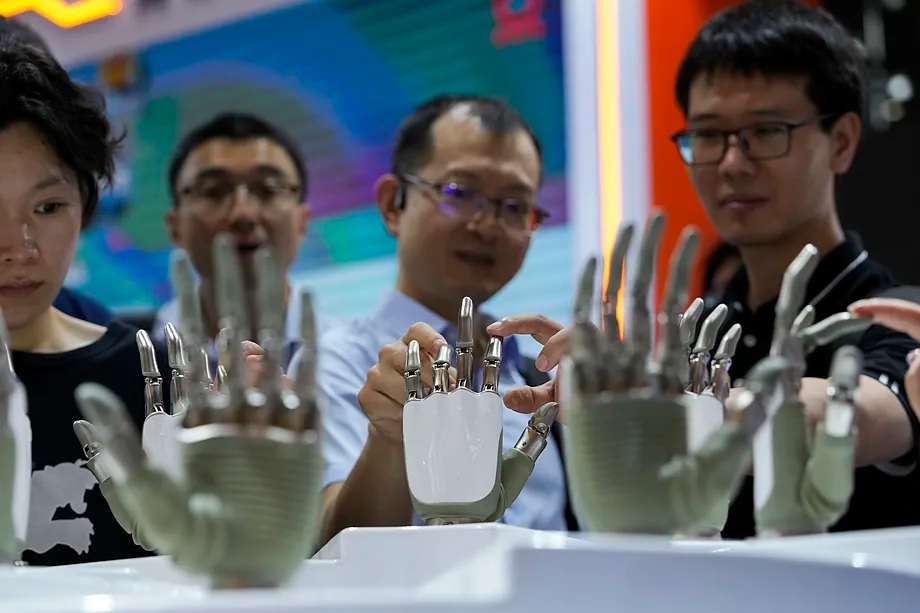In the exceptional exercise of openness that Beijing carries out once a year by opening the doors of its Parliament to local press and foreign correspondents, there is freedom to move through the imposing Great Hall of the People, in the heart of Tiananmen Square, and ask legislators without the usual filters. During the week-long annual political event in China, which concluded last Tuesday, in the halls of the legislature, Deputy Lei Jun, who is also the CEO of the tech giant Xiaomi, emphasized the importance of integrating artificial intelligence into all industries in the country. Or Deputy Liu Shuwei, a lieutenant general in the army, stating that the government should allocate more technological resources to support war preparedness.
This year's Chinese political conclave, in addition to presenting the roadmap to fix the economy (boosting foreign investment and consumer spending), has left a fairly clear conclusion: China is ready to win the global technological race.
Neither the economic slowdown, nor the huge debt of local administrations, nor the real estate crisis, nor the trade war with the United States will slow down Beijing's technological plans. That has been the message conveyed by Chinese leaders, starting with President Xi Jinping, who is very optimistic about the idea that the Asian giant will surpass its rivals and become the great technological superpower.
In recent days, Chinese government spokespersons have not stopped boasting about some recent successes, such as the overwhelming emergence of the AI model DeepSeek and the great excitement generated by the launch of another chatbot, Manus, whose developers claim that its AI performance surpasses that of the American OpenAI, creator of ChatGPT.
Developers from the tech company Beijing Butterfly Effect Technology Ltd Co, the company behind Manus, have announced a partnership with the team at the giant Alibaba that created the most cutting-edge AI model of this company, Qwen. The idea is to enhance what they have called the "world's first general artificial intelligence agent." This, unlike a chatbot like ChatGPT or DeepSeek, can operate as a digital autonomous employee, performing tasks independently.
The launch of Manus has generated so much attention that its registration page has crashed and now access to this platform is only possible through an invitation code from a registered user. Chinese media have reported that there is so much demand that many users are reselling these registration codes.
Manus is the latest example of the AI fever spreading in China, where top economic officials announced a fund of over one trillion yuan (around 127,000 million euros) a few days ago, backed by the central government, to support the development of AI by local governments and the private sector. The impact of all this development is also being felt in Chinese markets: the Hang Seng Tech index, which tracks the largest Chinese tech companies listed in Hong Kong, has risen more than 40% since mid-January.
President Xi has been transparent about his ambitions to quickly transform the country's industries with high-tech innovation to achieve self-sufficiency in the face of the restrictions imposed by Washington to limit China's progress. As reported by Reuters a few days ago, hundreds of large Chinese companies, from car manufacturers and state energy companies to banks and street food and beverage vendors, have announced their intention to use AI reasoning model technology.
Many municipalities have already integrated these chatbots into mobile applications that residents use for all kinds of basic services. The most widely used is DeepSeek, which revolutionized the global industry by developing a low-cost, open-source application without relying on high-performance chips, which were believed to be essential for launching such advanced models.
Despite the achievement of DeepSeek, some experts are not optimistic about China's victory in the technological race due to not having the most advanced semiconductors because of US restrictions. But this advantage of American companies may be numbered: researchers at Peking University claim to have surpassed the performance limits of chips by using new materials for their development that bypass the main component, silicon.
The team stated this week in a publication on the university's website that they have developed a transistor of their own engineering that could operate 40% faster than 3-nanometer silicon chips from the American giant Intel and the Taiwanese TSMC - the world's largest manufacturer of advanced chips - while consuming 10% less energy.
